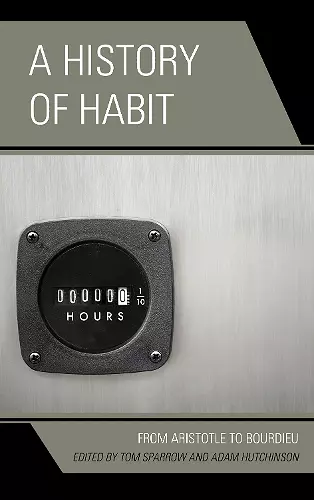A History of Habit
From Aristotle to Bourdieu
Tom Sparrow editor Adam Hutchinson editor
Format:Hardback
Publisher:Lexington Books
Published:10th Jun '13
Currently unavailable, and unfortunately no date known when it will be back
This hardback is available in another edition too:
- Paperback£48.00(9781498511292)

From bookshelves overflowing with self-help books to scholarly treatises on neurobiology to late-night infomercials that promise to make you happier, healthier, and smarter with the acquisition of just a few simple practices, the discourse of habit is a staple of contemporary culture high and low. Discussion of habit, however, tends to neglect the most fundamental questions: What is habit? Habits, we say, are hard to break. But what does it mean to break a habit? Where and how do habits take root in us? Do only humans acquire habits? What accounts for the strength or weakness of a habit? Are habits something possessed or something that possesses? We spend a lot of time thinking about our habits, but rarely do we think deeply about the nature of habit itself. Aristotle and the ancient Greeks recognized the importance of habit for the constitution of character, while readers of David Hume or American pragmatists like C.S. Peirce, William James, and John Dewey know that habit is a central component in the conceptual framework of many key figures in the history of philosophy. Less familiar are the disparate discussions of habit found in the Roman Stoics, Thomas Aquinas, Michel de Montaigne, René Descartes, Gilles Deleuze, French phenomenology, and contemporary Anglo-American philosophies of embodiment, race, and gender, among many others. The essays gathered in this book demonstrate that the philosophy of habit is not confined to the work of just a handful of thinkers, but traverses the entire history of Western philosophy and continues to thrive in contemporary theory. A History of Habit: From Aristotle to Bourdieu is the first of its kind to document the richness and diversity of this history. It demonstrates the breadth, flexibility, and explanatory power of the concept of habit as well as its enduring significance. It makes the case for habit’s perennial attraction for philosophers, psychologists, and sociologists.
The duality of habit—that which frees us and binds us—has fascinated philosophers for a long time. With historical breadth, interdisciplinary scope, and philosophical depth—tackling habit from the Greeks to the present, bringing psychology and sociology together with philosophy, and probing issues from the metaphysical to the practical—this is an excellent contribution to a perennially important topic. -- John Protevi, Louisiana State University
Habit really does have a history, as this book shows, but of course in disconcertingly chaotic lives such as ours, habits are principles of continuity or consistency. Here, the contributions of a remarkable range of scholars from across traditions and disciplines elucidate the matter of habit in a manner itself both varied and continuous. -- Crispin Sartwell, Dickinson College
This volume is a welcomed addition to the recently revived interest in the significance of habit for understanding human action—an interest lost in much contemporary social science and philosophy. As this collection of papers amply attests, the concept of habit has a rich intellectual history full of explanatory power and contradictory evaluations from the classics to our modern period, from Aristotle to Bourdieu. This book challenges us to overcome the intellectual habit of neglecting the central place of habit in shaping human thought and action. -- David Swartz, Asbury University
ISBN: 9780739181980
Dimensions: 235mm x 159mm x 29mm
Weight: 671g
328 pages